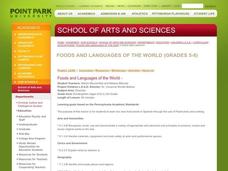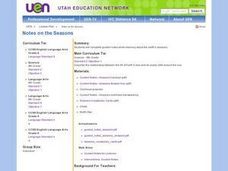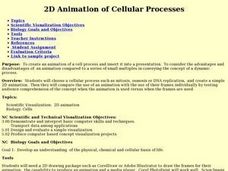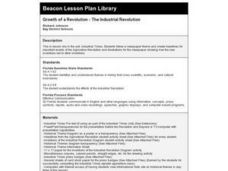Curated OER
An Introduction to Computer Components
Students experience the first lesson in computer servicing by observing computer components. They observe the internal workings of a computer during the lecture section of the lesson before dismantling a computer to identify its major...
Curated OER
The Human Mind
Young scholars read and discuss twin studies to explore the debate of nature vs. nurture. They create a list of characteristics and then look for evidence of whether it is primarily a genetic or environmental characteristic. All of the...
Curated OER
Researching a Scientist/Inventor
Students research scientists and inventors. They research their figure and write notes on a Fact Card template, biographical information regarding their figure, their occupation and achievements. After citing their information and...
Curated OER
Investigating the Biosphere With Planetary Models
Students create a biosphere using the computer program SImEarth. They work in small groups to create "Daisyworld" in which they model aspects of the Gaia hypothesis. They form a question to answer and choose variables to investigate in...
Curated OER
Foods and Languages of the World
Learners review Mexico's location and language and learn to pronouns 10 new Spanish food words. Students listen as the book, Corn is Maize is read, touching and passing around an ear of Indian corn. Learners discuss the contribution of...
Curated OER
We All Need Trees
Students complete a guessing game. In this tree products instructional activity, students view various household items and try to determine if they were made from trees. They discuss their findings and then read books about trees.
Curated OER
Food Web Relationships
In this food web worksheet, learners create a food web matrix and answer short answer questions about the food chain according to the matrix. Students complete 7 short answer questions.
Curated OER
Measure Up!
Students examine parallax and angular measurements. In this investigative lesson students calculate distances of objects and map their results.
Curated OER
Habitat Collage
Students explore habitats. In this science lesson plan, students discuss habitats and the insects that are found within each habitat. Students create a habitat collage.
Curated OER
Colored Drops
Students examine the properties of a liquid that contains water and food coloring and a liquid that contains water, food coloring and a liquid detergent. They interpret their data, describe properties, and make reasonable explanations...
Curated OER
Pendulum
Sixth graders are instructed on how to create a pendulum and measure the periodicity of the pendulum, using four different combinations of string. They are asked which influences the time more- the length of the string or the weight at...
Curated OER
Animals: Graphic Organizer
Second graders research information on the animal of their choice using the James E. Gerholt animal series books. They create a graphic organizer (concept web) using Kid Pix Deluxe 3 software, display information on screen, and create a...
Curated OER
Mapping Possible Solutions
Fourth graders propose possible sites for the heart of Florida state capital by mapping collected data onto a Florida state map and recording data in a Travel Log.
Curated OER
Adapting to Seasonal Changes in the Environment
Fourth graders discuss how plants and animals, including humans, adapt to climate and seasonal changes. They research the Colville people, and create dioramas that represent life during different seasons for Colville people.
Curated OER
Jack and the Beanstalk: Plant a Bean and Watch It Grow
Students plant bean seeds, watch them grow, and measure them with non-standard objects. They describe the bean's growth in a journal and record the growth on a calendar.
Curated OER
Notes on the Seasons
Students complete guided notes while learning about the earth's seasons.
Curated OER
Sorting
Students sort a variety of manipulatives and use a software program that provides more sorting practice.
Curated OER
Epidemiology: Graphing and Analyzing Health Data
Students graph data on fetal and infant mortality rates collected by the Centers for Disease Control and Prevention. They identify trends in the data and propose potential causes for the trends.
Curated OER
The Big Melt
Students experiment with a variety of materials used for insulation by melting ice cubes.
Curated OER
2D Animation of Cellular Processes
Students create an animation of a cell process and insert it into a presentation. They choose a cellular process such as mitosis, osmosis or DNA replication, and create a simple 2D animation.
Curated OER
Charting Seasonal Changes
Students research the Earth's patterns of rotation and revolution, create a chart and graph of these patterns and use them to explain the causes of night and day and summer and winter.
Curated OER
Graphing Data from the Chemistry Laboratory
Students graph and analyze data using a spreadsheet.
Curated OER
My Machine
Third graders explore how simple machines can affect their health and lifestyle. In addition, 3rd graders use their knowledge of simple machines to build a unique machine.
Curated OER
Growth of a Revolution - The Industrial Revolution
Fourth graders study the Agriculture Revolution and create a newspaper entitled Industrial Times. They follow a newspaper theme and create headlines for important events.
Other popular searches
- Scientific Tools Worksheet
- Using Scientific Tools
- Scientific Tools Technology
- Scientific Tools for Labs























